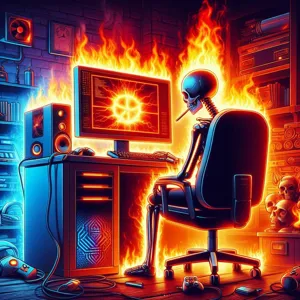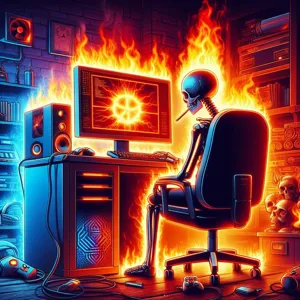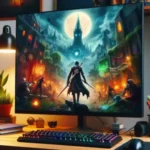In the exhilarating world of PC gaming, where immersive worlds and gripping narratives beckon us for hours on end, the thrill can sometimes lead to an unexpected consequence: burnout.
Whether you’re grinding through the latest RPG, honing your skills in competitive shooters, or exploring vast open worlds, the passion that fuels your gaming can easily transform into fatigue and frustration. Recognizing the signs of burnout is the first step, but reviving your game requires a proactive approach to ensure you maintain your enthusiasm and joy. In this blog post, we’ll delve into effective strategies to prevent PC gaming burnout, helping you rediscover the excitement of your favorite titles. From mastering the art of balance and setting healthy gaming habits to incorporating breaks and exploring new genres, these tips will not only refresh your gaming experience but also enhance your overall enjoyment. So, gear up and get ready to revive your game—we’re here to help you keep the fun alive!
1. Understanding Gaming Burnout: Signs and Symptoms

Gaming burnout is a phenomenon that many avid gamers face, yet it often flies under the radar until it becomes overwhelming. Understanding the signs and symptoms of burnout is the first step toward reviving your gaming experience and rekindling your passion for the virtual worlds you love.
One of the most common indicators of gaming burnout is a noticeable decrease in motivation. You might find yourself staring at your favorite game, but instead of excitement, you’re met with a sense of dread or indifference. The thrill of conquering your next boss or leveling up feels more like a chore than a challenge.
Physical symptoms can also manifest, such as fatigue and restlessness. You might experience eye strain from prolonged screen time, headaches, or even a general sense of malaise that makes it difficult to engage with the game. Social withdrawal is another red flag—if you’ve been neglecting your gaming buddies or avoiding multiplayer sessions that once brought you joy, it may be time to assess your mental state.
emotional signs often surface too. Feelings of irritability or frustration can creep in, turning gaming from an enjoyable escape into a source of stress. If you catch yourself becoming overly critical of your gameplay or the games themselves, that’s a clear sign that burnout is taking hold.
Recognizing these signs and symptoms is crucial, as they serve as a wake-up call to take a step back and evaluate your gaming habits. By understanding the causes of your burnout, you can implement strategies to reignite your passion and ensure that gaming remains a fun and fulfilling part of your life, rather than a source of stress.
2. The Science Behind Burnout: Why It Happens
Understanding the science behind gaming burnout is essential to preventing it. At its core, burnout occurs when the demands of your gaming lifestyle exceed your ability to cope, leading to physical, emotional, and mental exhaustion. This phenomenon is not exclusive to the gaming world; it parallels the burnout experienced in high-pressure jobs or demanding academic environments. However, in gaming, the triggers can be uniquely insidious.
When you immerse yourself in a game, particularly one that is competitive or requires significant time investment, your brain releases a cocktail of neurotransmitters like dopamine, which fuels your excitement and engagement. Initially, this surge feels rewarding, driving you to play for hours on end. But as you continue to chase that next achievement or high score, the pressure to perform can mount. This relentless pursuit can shift your gaming experience from enjoyable escapism to a stressful obligation.
Additionally, the social dynamics of gaming can contribute to burnout. Online multiplayer games often come with their own set of expectations, be it from teammates or the gaming community at large. The desire to maintain a certain level of performance or to keep up with friends can create an unhealthy pressure that detracts from the fun. Over time, this constant strain can lead to feelings of frustration, irritability, and even a sense of diminished competence—key indicators of burnout.
Moreover, the lack of breaks, poor time management, and neglecting other aspects of life—such as physical activity, social interactions, and even sleep—can exacerbate the problem. It’s easy to lose track of time when you’re deeply engrossed in a game, but ignoring your body’s signals can lead to both mental and physical fatigue.
Recognizing these factors is the first step in combating gaming burnout. By understanding the underlying causes, you can take proactive measures to restore balance to your gaming experience, ensuring it remains a source of enjoyment rather than a source of stress.
3. Establishing a Balanced Gaming Schedule

Establishing a balanced gaming schedule is crucial for maintaining your enthusiasm and preventing burnout. Just like any other hobby or passion, gaming requires a healthy dose of moderation. When you immerse yourself in virtual worlds for hours on end, the initial thrill can quickly fade, leaving you feeling drained and uninspired. To combat this, consider creating a gaming timetable that allocates time not only for play but also for other important aspects of your life, such as work, social interactions, exercise, and relaxation.
Start by assessing your current gaming habits. How much time are you spending in front of your screen each week? Once you have a clear picture, you can establish specific gaming sessions that fit comfortably within your overall schedule. For instance, you might decide to spend a few evenings a week indulging in your favorite titles while reserving weekends for longer gaming marathons. Importantly, ensure that you’re also penciling in time for breaks—step away from the screen every hour to stretch, hydrate, or even take a short walk. This practice not only prevents fatigue but also allows your mind to reset, enhancing your overall gaming experience.
Additionally, consider incorporating a variety of games into your schedule. Mixing genres—whether it’s an action-packed shooter, a thought-provoking puzzle game, or a relaxing simulation—can keep your gaming sessions fresh and exciting. By diversifying your gameplay, you’ll maintain a sense of novelty, making each session something to look forward to.
Establishing a balanced gaming schedule ultimately fosters a healthier relationship with your favorite pastime. It helps you savor the joy of gaming without letting it consume your life, ensuring that your passion remains a source of excitement rather than a cause for exhaustion. By being mindful of your time and energy, you can keep the flame of your gaming enthusiasm alive, ready to tackle new challenges and adventures!
4. Taking Regular Breaks: The Pomodoro Technique for Gamers
In the fast-paced world of PC gaming, it’s easy to lose track of time as you delve into immersive narratives and adrenaline-pumping gameplay. However, prolonged gaming sessions can lead to burnout, impacting both your performance and enjoyment. Enter the Pomodoro Technique—a time management method that can also be a game-changer for gamers seeking to maintain their passion and focus.
The Pomodoro Technique is simple yet effective: it’s all about timing your work intervals and breaks to optimize productivity. Here’s how it works: set a timer for 25 minutes and immerse yourself in your game of choice. Whether you’re racing through a competitive match or exploring a sprawling open world, give it your all during this focused period. Once the timer goes off, take a well-deserved 5-minute break. Step away from your screen, stretch, hydrate, or even do a quick physical activity to refresh your mind and body.
After four Pomodoro sessions, which equals about two hours of gaming, reward yourself with a longer break of 15 to 30 minutes. Use this time to recharge—grab a snack, chat with friends, or simply step outside for some fresh air. This structured approach not only helps prevent fatigue but also enhances your gameplay experience. By breaking up your sessions, you’ll notice improved concentration, better decision-making, and a renewed sense of excitement each time you log back in.
Incorporating the Pomodoro Technique into your gaming routine can transform your experience, allowing you to enjoy longer sessions without the dreaded burnout. So, the next time you find yourself glued to the screen for hours on end, remember to pause, reset, and revive your gaming spirit with this simple yet powerful strategy.
5. Diversifying Your Gaming Experience: Exploring Different Genres

When it comes to reviving your gaming enthusiasm, one of the most effective strategies is to diversify your gaming experience by exploring different genres. While it’s tempting to stick to your tried-and-true favorites—be it first-person shooters, RPGs, or simulation games—branching out into new territory can reignite your passion for gaming and keep burnout at bay.
Imagine the thrill of stepping into a vibrant world of indie platformers, where each level presents a unique challenge and artistic flair that could surprise and delight you. Or consider the adrenaline rush of a competitive fighting game, where mastering a new character can bring a refreshing twist to your reflexes and strategies. By sampling various genres, you not only expose yourself to different narratives and play styles but also enhance your overall gaming skills.
Perhaps you’ve never dabbled in the world of horror games—try immersing yourself in a spine-chilling atmosphere that tests your nerves and decision-making under pressure. On the other hand, if you often find yourself lost in sprawling open worlds, consider the brevity and intensity of a rogue-like game, where each run offers a fresh experience and keeps the gameplay dynamic.
Exploring different genres can also lead you to discover hidden gems that you never knew existed. Engaging with various gaming communities can open doors to recommendations and insights that can transform your gaming routine. You might even find yourself inspired by a completely different storytelling approach or art style that resonates with your personal tastes.
Ultimately, diversifying your gaming experience not only fights burnout but also enriches your appreciation for the medium as a whole. So, take a plunge into uncharted territories—your next favorite game could be waiting just beyond the boundaries of your usual gaming habits.
6. Setting Realistic Goals and Expectations
Setting realistic goals and expectations is crucial in preventing PC gaming burnout. It’s easy to get swept up in the excitement of a new game or the allure of achieving high ranks in competitive play. However, without a balanced approach, this enthusiasm can quickly turn into pressure and frustration.
Start by evaluating your current gaming habits and lifestyle. Are you dedicating too many hours to gaming at the expense of your physical health, social life, or responsibilities? Reflecting on these aspects will help you to establish a more sustainable gaming routine.
When setting goals, consider breaking them down into smaller, manageable milestones. Instead of aiming to complete an entire game in one weekend or to reach the highest level in a matter of days, target specific achievements, such as finishing a chapter or mastering a particular skill. This not only makes your gaming experience more enjoyable but also allows you to celebrate small victories along the way, reinforcing a sense of accomplishment without overwhelming yourself.
Moreover, be mindful of your emotional and mental state. If you find yourself feeling stressed or burned out after a gaming session, take a step back and reassess your goals. It’s perfectly okay to adjust them if they’re causing more harm than good. Remember, gaming should be a source of enjoyment and relaxation, not a job.
By setting realistic expectations for your gaming journey, you can create a healthier relationship with your favorite pastime, allowing you to enjoy every moment without the fear of burnout looming over you. Embrace the journey rather than just the destination, and you’ll find that your passion for gaming will endure for much longer.
7. Engaging with the Gaming Community: Finding Support and Inspiration

Engaging with the gaming community is one of the most effective ways to combat PC gaming burnout. The gaming world is teeming with passionate individuals who share your interests, and immersing yourself in this vibrant community can reignite your enthusiasm and provide invaluable support. Whether through forums, social media groups, or in-person meetups, connecting with fellow gamers allows you to exchange ideas, share experiences, and discover new games that you might not have encountered otherwise.
Consider joining online platforms like Discord or Reddit, where you can find dedicated channels for your favorite games or genres. These spaces offer a safe haven for discussing game strategies, sharing fan art, or even organizing group play sessions. Engaging in discussions and collaborating with others fosters a sense of camaraderie, reminding you that you’re part of a larger community that shares your passion.
Moreover, participating in community events, such as gaming tournaments, charity streams, or even local LAN parties, can provide a fresh perspective on your gaming experience. These events not only introduce a competitive edge but also allow you to meet like-minded individuals who can inspire you and reignite your passion for gaming. Learning from others’ experiences and stories can help you see your gaming journey in a new light, transforming burnout into motivation.
Lastly, don’t underestimate the power of content creation. Whether it’s streaming your gameplay on platforms like Twitch, uploading videos to YouTube, or writing about your gaming experiences, sharing your journey can create a sense of accountability and excitement. You might even discover a new passion for content creation that complements your gaming pursuits. By actively engaging with the gaming community, you’ll find support, inspiration, and a renewed sense of purpose that can help you overcome burnout and keep your gaming spirit alive.
8. Practicing Mindfulness and Self-Care
In the fast-paced world of PC gaming, it’s easy to become so immersed in your virtual adventures that you lose sight of the need for balance and self-care. Practicing mindfulness can serve as a powerful tool to help you step back, recharge your mental batteries, and maintain a healthy relationship with gaming. Mindfulness is all about being present, tuning into your thoughts and feelings without judgment, and recognizing when you need to take a break.
Incorporating mindfulness into your gaming routine can be as simple as dedicating a few minutes before or after your gaming sessions to focus on your breath or engage in a brief meditation. This practice not only helps clear your mind but also enhances your overall gaming experience by improving your concentration and emotional regulation.
Self-care is equally important. Make sure to prioritize activities outside of gaming that bring you joy and relaxation. Whether it’s taking a leisurely walk in nature, practicing a hobby, or spending time with friends and family, these moments can rejuvenate your spirit and provide a fresh perspective when you return to your games.
Additionally, pay attention to your physical health. Prolonged gaming sessions can lead to fatigue, poor posture, and strain on your eyes. Create a gaming environment that promotes comfort, like investing in ergonomic chairs, proper lighting, and regular breaks to stretch and hydrate.
By integrating mindfulness and self-care into your gaming lifestyle, you can not only prevent burnout but also enhance your overall enjoyment of the gaming world—transforming it into a source of joy rather than stress. Remember, gaming is meant to be fun, and taking care of yourself ensures that you can fully immerse in the adventures that await you.
9. The Role of Physical Activity in Preventing Burnout
In the world of PC gaming, where hours can slip away unnoticed, it’s easy to become so engrossed in virtual adventures that you forget about the physical realm. However, integrating physical activity into your gaming routine is not just beneficial; it’s essential for preventing burnout and maintaining your overall well-being.
Engaging in regular exercise can provide a much-needed balance to the sedentary lifestyle that often accompanies gaming. Whether it’s a brisk walk, a quick jog, or a session at the gym, physical activity releases endorphins—those feel-good hormones that boost your mood and enhance your mental clarity. This heightened state of well-being can translate into better focus and performance during your gaming sessions, allowing you to enjoy those epic battles and intricate storylines even more deeply.
Moreover, physical activity helps combat the physical strain that comes with long hours in front of a screen. Taking breaks to stretch or engage in a workout can alleviate muscle tension, improve posture, and enhance circulation, reducing the risk of aches and pains that can lead to frustration and disengagement from your favorite games.
Incorporating movement into your gaming life doesn’t have to be a chore. Consider adding short, energizing workouts between gaming sessions or even during loading screens. Some gamers find success in practicing yoga or meditation, which not only promotes physical health but also enhances mental resilience, helping you to reset and recharge.
Remember, gaming should be an enjoyable escape, not a source of stress. By prioritizing physical activity, you not only revive your body but also rejuvenate your passion for the game, ensuring that your adventures continue to be thrilling and fulfilling. So, step away from the screen, get your blood pumping, and return to your gaming kingdom with fresh eyes and a revitalized spirit!
10. Revisiting Old Favorites: Nostalgia as a Refreshing Escape
In the fast-paced world of PC gaming, it’s easy to get caught up in the whirlwind of new releases, cutting-edge graphics, and the latest multiplayer experiences. However, amidst the excitement, don’t underestimate the power of nostalgia. Revisiting old favorites can serve as a refreshing escape, rekindling the joy and passion that first drew you into gaming.
Imagine booting up a classic title that you spent countless hours immersed in—perhaps it’s the pixelated charm of a retro platformer or the immersive storylines of an RPG that defined your childhood. The familiar soundtrack, the recognizable graphics, and even the gameplay mechanics evoke a sense of warmth and comfort. These games often hold cherished memories, and engaging with them again can transport you back to a simpler time, allowing you to step away from the pressures of modern gaming.
Nostalgia isn’t just about reliving the past; it’s an effective way to recharge your gaming spirit. When you dive back into a beloved game, you can escape the demanding nature of new titles while still enjoying the thrill of gameplay. Whether it’s the strategic challenges of an iconic strategy game or the heart-pounding excitement of a classic shooter, these experiences can provide a much-needed break from the relentless pursuit of achievements and online rankings.
Moreover, revisiting old favorites can inspire new insights into your current gaming habits. You may find yourself appreciating the nuances and storytelling techniques that shaped your gaming experience years ago. This can reignite your passion for gaming and encourage you to explore similar genres or titles you may have overlooked in your quest for the newest releases.
So, the next time you feel the weight of burnout settling in, consider taking a trip down memory lane. Dust off that old game, gather some snacks, and allow yourself to enjoy the timeless magic of your favorite virtual worlds. Embracing nostalgia not only fosters a sense of connection to your gaming roots but can also be a powerful antidote to the fatigue of constant innovation. Reinvigorate your passion for gaming by revisiting what made you fall in love with it in the first place.
11. Limiting Screen Time: Finding the Right Balance
In the immersive world of PC gaming, it’s easy to lose track of time. What starts as a quick session to unwind can morph into hours of relentless gameplay, often leading to gaming burnout. To combat this, it’s crucial to establish a healthy relationship with your screen time. Finding the right balance isn’t just about reducing hours spent in front of the monitor; it’s about enhancing your overall gaming experience.
Start by setting specific time limits for your gaming sessions. Consider using timers or alarms to remind you when it’s time to take a break. This isn’t just about stepping away from the keyboard; it’s about giving your eyes a rest and allowing your mind to recharge. A good rule of thumb is the 20-20-20 rule: every 20 minutes, look at something 20 feet away for at least 20 seconds. This simple practice can significantly reduce eye strain and help maintain focus during your gaming adventures.
In addition to time limits, consider diversifying your gaming schedule. Rotate between different genres, platforms, or even other hobbies to keep your interest piqued and prevent monotony. Engaging in a variety of activities, be it reading, exercising, or exploring new games, can provide a refreshing break from the screen and reignite your passion for gaming.
Finally, don’t underestimate the power of social connections. Instead of gaming solo for hours, invite friends to join you for co-op sessions or multiplayer games, creating a social atmosphere that enhances the experience. Not only does this break up the routine, but it also fosters camaraderie and shared excitement, making your gaming time feel more meaningful.
By implementing these strategies, you can cultivate a balanced gaming routine that not only prevents burnout but also enhances your enjoyment of the immersive worlds waiting at your fingertips. Remember, gaming should be a source of joy and relaxation, not a chore. So take a step back, breathe, and revive your game!
12. Exploring Offline Hobbies to Complement Your Gaming
Gaming can be an exhilarating escape into immersive worlds, but when the thrill fades, it can lead to burnout. One effective way to revitalize your passion for gaming is by exploring offline hobbies that can provide a refreshing balance to your digital adventures. Engaging in activities outside of your gaming console or PC can reignite your creativity and help you return to your favorite games with renewed enthusiasm.
Consider picking up a physical hobby, such as painting, drawing, or crafting. These creative outlets not only allow you to express yourself but also provide a tangible sense of accomplishment. Doodling your favorite gaming characters or creating fan art can serve as a bridge between your gaming passion and your newfound hobby.
If you enjoy storytelling and strategy, why not dive into tabletop games or role-playing games (RPGs)? Gather a group of friends for a game night, where you can immerse yourself in narratives that unfold in real time, fostering social connections and shared experiences. This can also give you a fresh perspective on character development and story arcs, enhancing your understanding of the games you play online.
Outdoor hobbies can also be incredibly beneficial. Hiking, biking, or even gardening can help you appreciate the beauty of the world outside your screen. These activities not only promote physical health but also allow you to recharge your mental batteries. The natural environment can inspire new ideas for your gaming narratives, or simply provide you with a much-needed break from screen time.
Lastly, consider picking up a musical instrument or exploring cooking. Both activities require focus and skill, allowing your mind to shift gears and engage in something entirely different. Whether it’s strumming a guitar while listening to your favorite game soundtracks or creating culinary dishes inspired by your favorite game worlds, these offline hobbies can add depth to your life, making your return to gaming all the more enjoyable.
By integrating these offline hobbies into your routine, you’ll create a more well-rounded lifestyle that keeps your passion for gaming alive and vibrant, ultimately preventing the dreaded burnout while enriching your overall gaming experience.
13. The Importance of Sleep for Gamers
In the adrenaline-fueled world of PC gaming, it’s easy to lose track of time, especially when you’re immersed in a gripping narrative or battling it out in multiplayer arenas. However, one critical aspect that often gets overlooked in the quest for high scores and epic loot is the importance of sleep. For gamers, a well-rested mind is just as essential as a powerful graphics card or a high-refresh-rate monitor.
Sleep is the ultimate reset button for our brains. It plays a vital role in cognitive function, memory consolidation, and emotional regulation—all of which are crucial for peak gaming performance. When you’re sleep-deprived, your reaction times slow, your decision-making skills suffer, and your ability to strategize diminishes. The result? Frustration, poor performance, and, ultimately, burnout.
Moreover, a lack of sleep can lead to increased stress levels and even physical health issues, which can further detract from your gaming experience. In contrast, quality sleep enhances your focus, improves your reflexes, and revitalizes your creativity, allowing you to tackle challenges with renewed vigor.
To combat gaming burnout, prioritize your sleep schedule as rigorously as you would your gaming sessions. Aim for 7 to 9 hours of quality sleep each night. Establish a bedtime routine that helps you wind down—whether that’s reading a book, meditating, or even engaging in light stretching. Steer clear of screens an hour before bed; the blue light emitted by devices can disrupt melatonin production, making it harder to fall asleep.
Remember, your skills will only shine through if your mind is sharp and your body is well-rested. By valuing sleep just as much as your gaming achievements, you’ll not only enhance your performance but also ensure a more enjoyable and sustainable gaming journey. So, power down that gaming rig and give yourself the rest you truly deserve!
14. Reflecting on Your Gaming Journey: When to Step Back
Reflection is a powerful tool in the realm of PC gaming, especially when the thrill of your favorite virtual worlds begins to wane. The excitement that once fueled countless hours of gameplay can sometimes transform into a sense of obligation, leading to that dreaded feeling of burnout. Recognizing this shift is crucial; it’s essential to check in with yourself and assess your gaming journey.
Take a moment to consider your initial motivations for gaming. Was it the thrill of competition? The joy of exploring expansive narratives? Or perhaps the camaraderie shared with friends? Reflecting on these aspects can help you identify whether your current gaming routine aligns with your original passions. If you find that the spark has faded and sessions feel more like chores than enjoyable escapes, it may be time to step back.
When you decide to pause, resist the urge to fill that time with obligations or guilt. Instead, use this opportunity to explore other interests—read a book, dive into a new hobby, or simply relish the outdoors. This break can help rekindle your enthusiasm for gaming by providing fresh perspectives and renewed energy.
Moreover, consider journaling your thoughts and experiences. Documenting your gaming journey not only highlights your achievements but also serves as a reminder of the adventures you’ve had. When you finally return to your PC, you may find a newfound appreciation for the games you once loved, ready to engage with them on your own terms, free from the weight of burnout. Embrace this reflective pause as a vital step in sustaining a balanced and fulfilling gaming experience.
15. Conclusion: Embracing a Healthy Gaming Lifestyle
In the fast-paced world of PC gaming, it’s easy to lose yourself in marathon sessions and forget about the importance of balance. As we wrap up our exploration of ways to prevent gaming burnout, it’s essential to embrace a healthy gaming lifestyle that not only enhances your gaming experience but also nurtures your overall well-being.
A healthy gaming lifestyle is about more than just moderation; it’s about creating a sustainable approach to your passion. Make it a habit to schedule regular breaks during your gaming sessions. Step away from your screen to stretch, hydrate, and even engage in some physical activity. This simple practice can refresh your mind, allowing you to return to your game with renewed focus and energy.
Moreover, diversify your interests. While gaming is exhilarating, consider integrating other hobbies and activities into your routine. Whether it’s reading, exercising, or spending time with friends and family, these pursuits can provide a much-needed mental reset and help prevent the feeling of burnout.
Stay attuned to your feelings. If you find yourself dreading gaming sessions or feeling pressured to play, it might be time to reassess your relationship with your hobby. Remember, gaming should be a source of joy and relaxation, not a chore. By prioritizing your mental and physical health, you can create an enjoyable gaming environment that keeps your passion alive.
In conclusion, embracing a healthy gaming lifestyle is not just about preventing burnout; it’s about enhancing your overall gaming experience. So, take a step back, breathe, and enjoy the adventure that gaming has to offer, ensuring it remains a rewarding part of your life for years to come.
As we wrap up our exploration of how to prevent PC gaming burnout, we hope you feel empowered to reclaim your gaming experience and keep the passion alive. By integrating these tips into your routine—whether it’s setting healthy boundaries, exploring new genres, or taking breaks to engage in other activities—you can breathe new life into your gaming sessions. Remember, gaming should be a source of joy and relaxation, not a chore. So, take a step back, listen to your needs, and nurture your love for gaming in a sustainable way. Here’s to countless enjoyable hours ahead, filled with excitement and adventure—game on!






